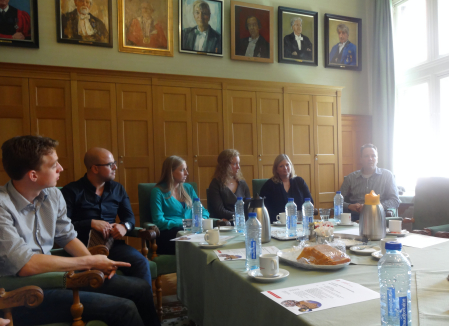Univeristy of Groningen strives for greener world and encourages participation from students and faculty members

Along with the eco-friendly buildings and sustainable university office departments, much research studies and new projects are conducted by both RUG faculty members and students.
In the case of professor Linda Steg in the field of environmental psychology, for example, she studies how the environment affects human behavior, how people affect the environment, and how to promote environmental behavior.
“Traditionally, if we look at policies, people act on their own interest,” professor Steg said. “So if you want to encourage environmental behavior, you should make it attractive. One of the rewards people might get from doing something good for the environment is that you get a warm heart and be motivated by it.”
While studying sustainability, professor Steg makes sure to consider another important factor – the quality of life.
“If we promote environmental behavior and people are really unhappy about it, then you would not call it sustainable,” she pointed out. “So we should also see how all kinds of energy policies or changes in energy systems affect people’s quality of life.”
Besides the research conducted by professors, RUG newly introduced the Green Mind Award two years ago as an initiative for staff and students to submit green ideas.
“What is great is that everybody starts thinking about what they can do to make the university more sustainable,” Jager said. “You really get a lot of beautiful ideas from these people, and that is exactly what we want to have.”
The project that won first prize for the 2014 Green Mind Award was the proposal for a facade and rooftop garden at the university library. The green garden and the green walls could be used to store rainwater, increase biodiversity, and most of all, raise public awareness about sustainability.
“We believe this project will create more knowledge about sustainability as it is more in the face of students,” said Menno Stellingwerf, a student in RUG and winner of the 2014 Green Mind Award. “We would like to see that students know a lot is being done on sustainability and that they could also engage in this at home.”
In second place was SENSEOS (SENSible hEating Operation Solutions), a computer-based control of the building’s heating system. The system optimizes heating in the building based on the presence of users, weather conditions and user calendars.
“We are making the building more energy efficient,” said Tuan Nguyen, a Ph.D student in RUG and runner-up for the 2014 Green Mind Award. “We can understand what is going on in the building so that it can optimally control all the light and the heating.”
This idea and proposal are actually put into practice.
“Thanks to the university’s initiative, we were able to actually develop some of those ideas and make prototypes,” said Faris Nizamic, a Ph.D student in RUG and runner-up for the 2014 Green Mind Award. “At this moment, our solutions are implemented within the faculty building.”
Working on this project led some of its founders to take on a couple of related sub-projects. One was creating a software program that will turn PCs into sleep mode when they are not being used. Another project was about showing occupants of a building how they are doing in energy consumption.
On a related note, a student-driven, staff-supported university department was launched in the beginning of this summer, under the name of the “Green Office.” The Green Office manages and coordinates activities regarding the university’s sustainable development.
“I think it is really easy to just start making changes,” said Yanike Sophie, the project manager of the Green Office. “I think this is a lot simpler than research, and I think you can reach a lot of people if you do these simple things.”
One of the projects, Foodsavers, is a student-based group with the aim to reduce food waste. Basically, Foodsavers is building a network of volunteers to collect edible food that would otherwise be thrown away from supermarkets, canteens and cafes. The collected food would then be distributed for no profit to willing students and other people.
“At the moment we are still working with many people, and it is really great to see how many people are interested in such an initiative,” said Lena Scholz, one of the members of the Foodsavers. “I hope that now, after summer, we can get started to contact canteens and supermarkets to actually save food.”
There is another Green Office project where students are involved in the issues of sustainability and cohesion, conducting activities such as gardening a shared vegetable garden near campus.
“It is especially those ideas that the science or sustainability science as a whole usually misses out on or does not even consider,” Laugs observed. “But then if you use the Green Mind Award to stimulate this creativity, you can see these ideas. The same is for Green Office. You provide a platform for people with these creative small ideas and realize with just a little bit of help, that is where it all starts.”
Jang Ji-won
jiwon9402@ewhain.net

